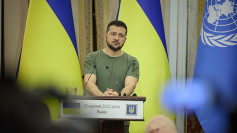An Indonesia researcher who concentrates on mental health, suicide prevention and digital interventions is using Google Adwords to combat suicide.
Sandersan Onie, 28, a researcher at the Black Dog Institute at the University of New South Wales in Sydney, Australia, is leading his team in using Google's ubiquitous online advertising platform as a system of suicide intervention. With it, they hope to reach individuals on the brink of suicide and point them toward the appropriate online assistance.
Onie's system will trigger a Google advertisement for a website containing a suicide hotline, based on keywords entered in Google's search engine.
"We will target keywords which we believe people are using to search up suicide means such as 'asphyxiation methods' or 'painless ways to die', and our ad will appear on the top," he explains.
The advertisement will feature a message to promote help-seeking, while the Google landing page will automatically feature more messages encouraging the individual to immediately seek help and point them toward online modules regarding depression. In countries where it is available, the page will also show ways to contact suicide hotlines. This landing page will be launched in early 2021.
As of now, Onie's team - made out of researchers from the Black Dog Institute, the Indonesian Psychological Association, Google Indonesia, and Indonesian mental health organizations - is running the research both in Australia and Indonesia.
"We focus on evaluation in Australia due to access to data, but are focusing on implementation in Indonesia given the absence of a hotline," he explains.
The intervention process is based on a field of suicide prevention called "means restriction" which finds that individuals in crisis are likely to search up means on Google (national suicide rates correlate with search volume for suicide-related terms in the U.S., Japan, Taiwan, among other countries).
Onie refers to the work of colleague and team collaborator, Pat Berlinquette which ran a similar intervention program in America on a smaller scale. It showed that a landing page with help-seeking information "had a 28% conversion rate despite the industry standard of 4%, suggesting the campaign was hugely successful" in reaching suicidal individuals in time.
"Keeping someone safe or intervening during periods where suicidal impulses take hold greatly increases chances of survival," Onie says, adding that "We envisage that this will be even more successful (and important) in countries like Indonesia where there is no hotline," suggests Onie.
Google itself also put up seek-help Ads, but Berlinquette's research notes that the search engine doesn't utilize "enough variations of searches to trigger" the hotline and Ad.
Like in a lot of other countries, the COVID-19 pandemic has not been kind to Indonesia's mental well-being. According to recent research by the Association of Indonesian Mental Health Specialists, there has been a 57.6% increase in cases of depression around the country since the pandemic began.
This is something that connects with Onie on a personal basis. His work is driven by a personal experience with depression. Three months after his birth, his father began suffering from anxiety attacks that were "crippling" the person he calls "a great man." By the time he was in high school, Onie himself began suffering from depression, a term he had never even heard of. He shares that his grandfather had also suffered from the same ailment.
In Indonesia, Onie explains, "help and awareness were scarce while stigma is high - similar to many countries in Asia."
Indeed, this specific project came about when Onie looked up suicide-related material in Australia for work and noticed that a suicide hotline banner appeared, as they do in several countries.
"Out of curiosity, I searched suicide-related terms with my country setting to Indonesia, and rather than a help-seeking page or suicide hotline, there were several unmoderated forums which did contain information on how to die by suicide. That's when I reached out to (Berlinquette)."
A key element to the success of this specific intervention process is making sure that Onie's team's program can detect the right keywords to trigger their Ad. As such, they have involved people with "lived experience", meaning those who have battled depression and suicidal thoughts (or even attempts), in the research.
Including these consultants in the design process of the landing page, messaging, as well as for deciding keywords "greatly increase the chances" of the program to work, Onie says.
His team works with people with lived experience from different age ranges, genders, and socio-economic backgrounds, to ensure that their messaging is effective in reaching as many as possible. In Australia, in the conception of the project, the team involved the Lived Experience Advisory Group.
Google Ads allow Onie and his team to present different messages and landing pages to different populations. They use this feature to present messaging most relevant to the different specific groups of individuals.
Each consulting group will design landing pages that are designed for groups sharing the same characteristics as the consultants - "for example women aged 16 to 25 years old or men above 30, says Onie, adding that "While we cannot guarantee that each person will seek help or utilize the resources, by using lived experience co-design, we greatly increase the chances."
"We can tailor the ad and web page shown depending on gender and age. While other organizations may use this feature to market their goods and services, we can use this feature to ensure the messaging they receive is as relevant as possible to help encourage help-seeking," he adds.
Onie admits that ironically, the COVID-19 pandemic - which has caused the rise in depression cases - has made it a challenge to run the program and prove that it works. They were hoping to publish Berlinquette's data but had to delay it due to the pandemic. They were, however, successful in obtaining a grant from Suicide Prevention Australia, "suggesting that the scientific rationale for the intervention passed muster", says Onie.
Because it remains a challenge to obtain funding in Indonesia, Onie established a non-profit that is eligible for a Google grant.
So far, the research is being well-received by other researchers, including those from India and Spain, reaching out to implement something similar in their countries. Onie is elated at the reception.
Says Onie that "Personally, this - and my other work at the institute - is extremely-rewarding, especially given my history with depression and suicidal ideation. It helps give meaning to my experiences and makes me feel that I can use my experiences to help others that may be going through something similar."






